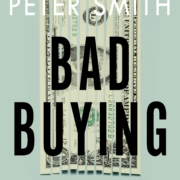Why Did Apple Sack Top Procurement Guy?
Tony Blevins was sacked as Apple’s VP of procurement recently. He was at a car event in Pebble Beach with his Mercedes-Benz SLR McLaren when he was approached by TikTok creator Daniel Mac, who asks the owners of expensive cars what they do for a living. Blevins answered “ ‘I have rich cars, play golf and fondle big-breasted women, but I take weekends and major holidays off. Also, if you’re interested, I got a hell of a dental plan.’
That’s an approximate quote from the 1981 comedy movie, Arthur, where Dudley Moore says ‘I race cars, play tennis and fondle women, but I have weekends off and I am my own boss.’ So it wasn’t an original comment, which doesn’t really excuse him – also, if you are going to say something some might consider offensive, at least make sure its funny!
Anyway, the video hit the Internet, staff at the firm complained to Apple HR, and he went. He apologised, telling Bloomberg, “I would like to take this opportunity to sincerely apologize to anyone who was offended by my mistaken attempt at humor”.
Blevins reported to either the CEO Tim Cook or COO Jeff Williams. He was known as the Blevinator and had a reputation as a fearsome, tough negotiator, with stories of his tactics reported in the press – including getting FedEx to hand-deliver his rejection of a price proposal to their rival, UPS! To be fair, some of his tactics seem pretty smart. Running what was in effect a real-life reverse auction by going from supplier to supplier in their hotel rooms, negotiating to drive down price on glass for the new Apple office seems a reasonable approach to me. He also rotated staff every couple of years to avoid them forming close relationships with suppliers – again, many firms do that and to some extent it is not a bad idea from a complacency or indeed corruption poot of view.
But we might wonder why Apple needed to take such a tough line with suppliers given their very healthy profit margins. The simplest answer is – because they can. Power is still the basis of commercial relationships, as Professor Andrew Cox always told us. Where Apple hold that power, why wouldn’t they use it with their suppliers? We could argue however that sacrificing a little margin in order to develop stronger relationships with key suppliers would be worth it in the longer run. And if Blevins tough negotiation actually drove suppliers out of business or out of Apple’s supply base, then it certainly wasn’t sensible.
So there are three reasons why Apple might have got rid of the Blevinator. The most obvious is the (arguably) offensive nature of his comment, and perhaps what it might indicate about his general attitude. Tim Cook, CEO of Apple, has spoken about the need to get more women into tech roles so his CPO making such comments is not the best support for that objective.
The second might be that Apple wants to move away from the old-fashioned leveraged approach to procurement and become more collaborative, working in a more harmonious manner with suppliers. Blevins might have stood in the way of that, representing as he did that previous tough approach.
And finally, in many firms, a CPO driving a supercar might ring some alarms. I remember a Ministry of Defence procurement official in the UK years ago who earned maybe £60K a year (in current terms), yet lived in a multi-million pound mansion in the Thames Valley. Surprisingly, no-one asked the key question – where did he get the money from? The answer of course was “bribes paid by suppliers”.
Now I’m not accusing Blevins of anything of that nature – I’m sure he earned plenty from Apple. Finding the odd half-million for his car wasn’t a problem for him given his likely stock options. But perhaps driving that sort of car just isn’t the sort of image a CPO should project. And a supplier might well think, “Apple can afford to pay me a bit more for my product if its VPs are driving supercars!”
Anyway, this is a “Bad Buyer” story rather than bad buying, but fascinating, nonetheless. And if you want to learn more about it, do listen to Kelly Barner’s excellent podcast on this topic at Supply Chain Now – it’s a very enjoyable, informative and interesting 20 minutes during which time she goes into more detail on Apple’s approach to suppliers – and how that might be changing.









Leave a Reply
Want to join the discussion?Feel free to contribute!